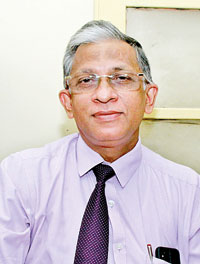News
Health DG says strategy is to immunise every eligible person in the country

Dr. Asela Gunawardena
We have reserved 225,000 vaccines for the second doses of those who were given the jabs starting January 29. The round of second doses will be administered from the second week of April, reiterated the Director- General (DG) of Health Services, Dr. Asela Gunawardena.
He said that up to Thursday, a little over 750,000 vaccines have been given.
When asked whether after the first dose, a person can get COVID-19, he said that it can happen because it takes about three weeks for the development of antibodies.
How many people have got the infection after receiving the first dose is not known, said Dr. Gunawardena, explaining that a post-vaccination surveillance study is being carried out by the Sri Jayewardenepura University along with a few hospitals.
Explaining that many of the problems which have dogged the delivery of the community vaccination programme have been sorted out, the DG said that most of the issues seemed to be within the Colombo Municipal Council (CMC) area. It has been difficult for officials to manage areas such as Central Colombo, as the number of permanent and temporary residents is not known. The CMC has the highest floating population in the country.
Dr. Gunawardena assured that the Health Ministry’s strategy is to immunize every eligible person in the country.
“Currently, we are giving priority to those over 60 in the high-risk areas, where vaccination has already taken place. We are doing mopping-up operations to catch all those over 60s in these areas. Then it will be other areas under the CMC and Colombo and Gampaha districts, followed by the Kalutara district and then inland, according to the stocks coming in,” he added.
Caseload coming down
The COVID-19 caseload is coming down, said the Director-General of Health Services, stressing that speculation that the numbers are coming down because of low RT-PCR testing is not valid.
Pointing out that a higher number of tests would depend on the number of cases and their contacts, he said that to get the right picture of how widespread COVID-19 is, one must look at people who walk into hospitals for other ailments but test positive when RT-PCR tests are done on them. This is the positivity rate that needs to be taken into account as it would go up if the caseload is high, but these numbers have reduced drastically.
“Some time ago, the National Hospital of Sri Lanka (NHSL) used to have 60-80 positive cases per day but now it is not even 10 which is an indication of the caseload coming down,” he said, adding that now the clusters are mainly from factories and economic centres like polas and arthika madyasthana. In the recent past, there were about 70 positive cases detected from the Piliyandala economic centre.
| Vaccine arrivals and administration timeline
| |


